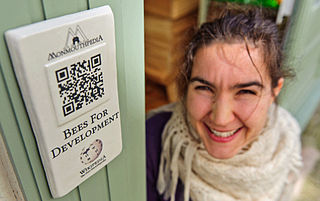
Wikimedia UK is pleased to announce that Roger Bamkin and Terence Eden are transferring ownership of QRpedia to Wikimedia UK.
As a donation from Roger and Terence, the intellectual property in QRpedia and the qrpedia.org and qrwp.org domains will be transferred to Wikimedia UK, which will maintain and support the development of the QRpedia platform for the future for the benefit of the Wikimedia community. Roger and Terence will act as honorary advisors to Wikimedia UK in this, as well as retaining their moral rights of attribution, but will not receive any financial consideration for this. The transfer of the domains will take place as soon as the remaining legal details have been resolved.
QRpedia is a web tool that uses QR codes placed on or near objects or locations to link mobile users to Wikipedia articles about those objects or locations in their language. The agreement was made as a result of negotiations at our board meeting on 8 February 2013.
Wikimedia UK is grateful for this donation which will allow ongoing technical support for a number of Wikimedia-related outreach projects where QRpedia is already in use, including Wikimedia UK’s work with the Derby Museum and Monmouthpedia, and many others worldwide.
Chris Keating, Chair of Wikimedia UK, said: “I am very pleased that we have reached agreement with Roger and Terence and that Wikimedia UK will support, preserve and improve QRpedia for the benefit of the whole Wikimedia community. QRpedia is a great innovation and already plays an important role in Wikimedia outreach projects not just in the UK but worldwide. I look forward to working with Roger and Terence to develop QRpedia further in future.”
Roger Bamkin, co-creator of QRpedia, said: “Terence Eden and I are thrilled to see the projects in Monmouth, Johannesburg, Gibraltar, Sayada and Fremantle that have inspired volunteers to write about different towns in dozens of different languages. Who would think you could tour Monmouth in Hungarian or Gibraltar in Punjabi?”







Hello,
this is real good news. Thanks to all of You that have contributed to this result. Finally we will be able to apply QRpedia codes freely with a wide range of interesting projects in the field of cultural cooperation. Is there anybody apart form me that would appreciate if the QRpedia code itself would contain the word “Wikipedia”? It would make it more obvious to the reader where about the QR code will lead him /her and make it easier for her / him to decide if he /she likes to follow it or not. Many custodians at the museums at least in Germany argue that they feel it would be important to let the visitor know that by following the code he / she is somehow leaving the exhibition even though just for a while. And on the other hand the integration of “Wikipedia” into the code itself would make less necessary to design surrounding communication such as shown on the photo. Who is there to change the programming code so it will automatically include “Wikipedia” into the QRpedia sign? Thanks for letting me know. Barbara Fischer (WMDE)
Hi Barbara,
Thanks for your comment. The word “Wikipedia” can be placed next to the locatino of the code so that users can be clear about where the QRcode takes them. Is that what you mean?
Thanks,
Stevie
Hi Barbara, all of the QRpedia code is available under a free licence, so any programmer can fork a version of (for example) the generator code for a specific purpose. If WMDE wanted to include a particular note within the generated QR image for museums, then I’d encourage them to do so. That’s how these ideas grow and flourish, of course.
The code can be found at:
http://qrwp.googlecode.com/svn/trunk/
if anybody wants have a look at it – or even to make the functionality that Barbara wants!
Doug
This should have been done at the very outset. While I have no doubt that everything has been done with the very noblest of intentions, it is not really appropriate on point of principle that local government should place on public buildings plaques with QR codes resolving to URLs at domains controlled by a private individual, as appears to have happened in Monmouth.